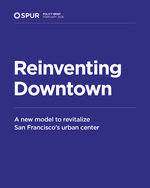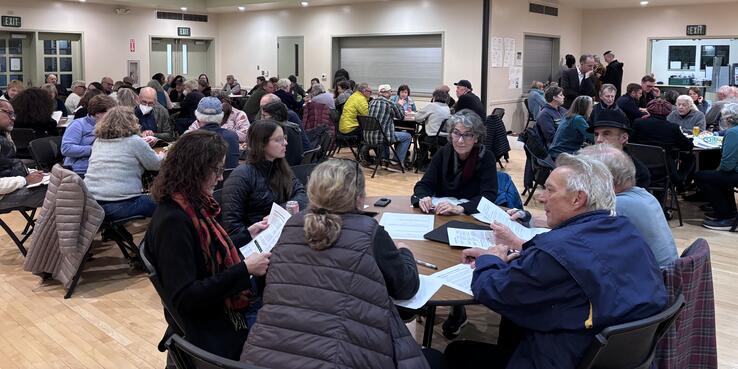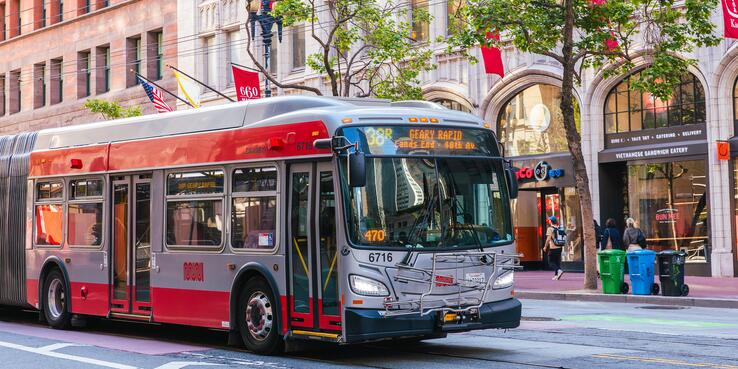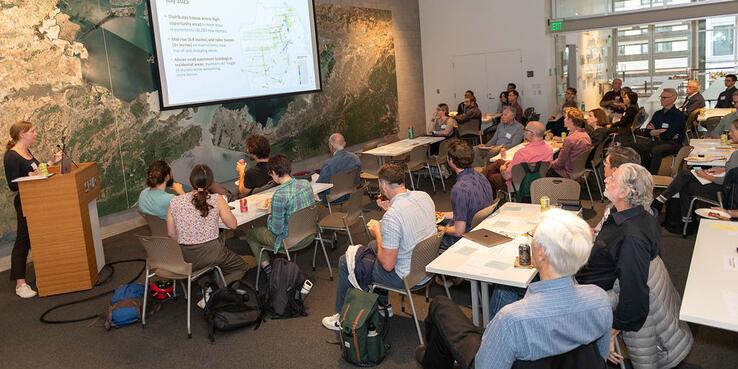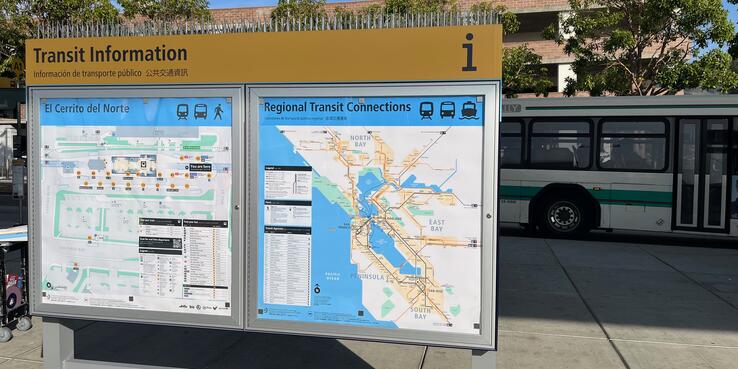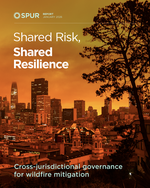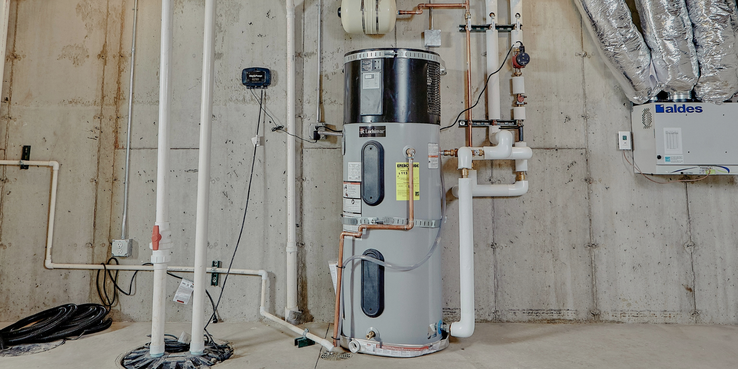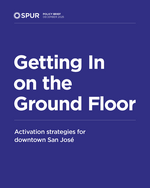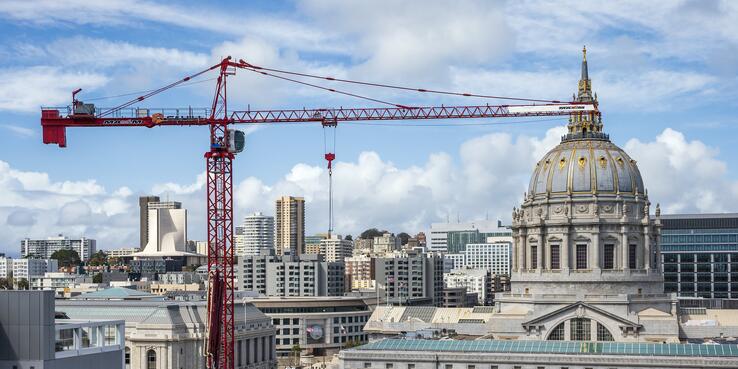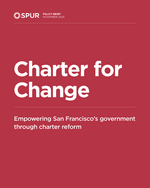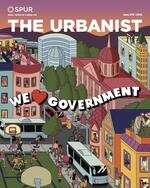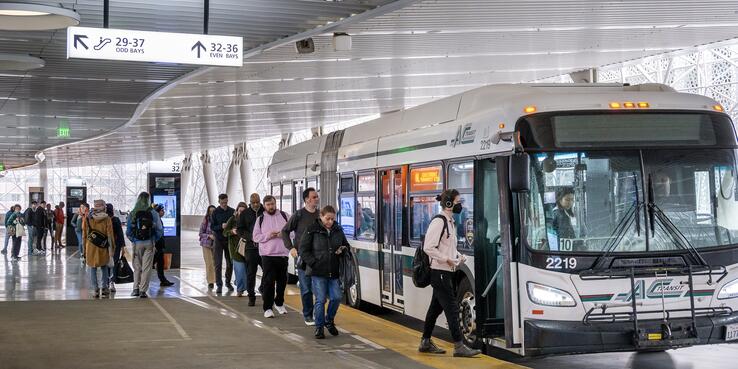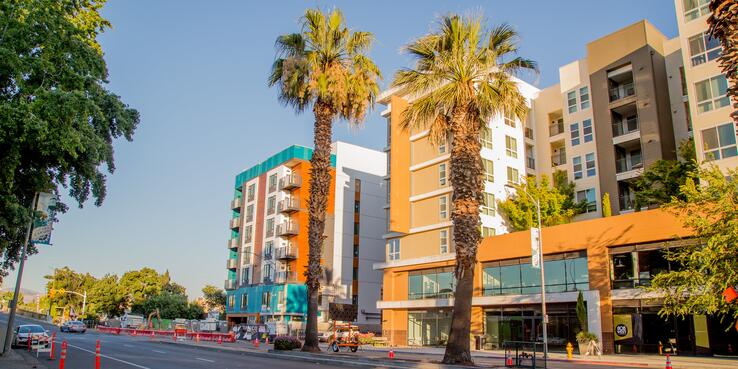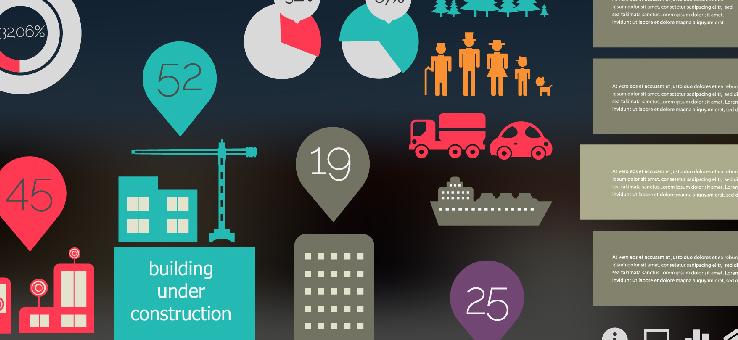
Improving the Fiscal Climate for New Housing: Q&A With Leigh Lutenski
News / The City of San Francisco is currently examining its affordable housing policies and their impact on the market for building new housing. SPUR asked Leigh Lutenski, the city’s director of Joint Development, about her division’s work supporting the city on its affordable housing obligations. She emphasized the need for policies that balance affordability goals with economic feasibility, in part by providing greater certainty to housing developers about affordability requirements.
Accelerating Downtown San Francisco’s Revitalization: Q&A with Sujata Srivastava
News / As downtown San Francisco grapples with an oversupply of commercial space and anemic street activity, the city’s leaders have an opportunity to reimagine the area to create more housing, boost entrepreneurship, and nurture the arts. In a new brief, SPUR proposes establishing a quasi-public entity to plan and deliver capital projects, negotiate real estate deals, and provide public financing. We asked SPUR’s Sujata Srivastava how the envisioned authority could tackle downtown’s challenges.
Designing the Future of Downtown San Francisco: Q&A with Shola Olatoye
News / In October, Shola Olatoye became the first CEO of the San Francisco Downtown Development Corporation (DDC), a nonprofit organization formed in early 2025 to raise and deploy private investment to transform downtown San Francisco. The DDC is evaluating options to create a long-term entity with regulatory and financing capacity to play a greater role in downtown’s economic vitality. On the heels of our policy brief Reinventing Downtown, we spoke with Olatoye about the DDC’s vision, partnerships, and priorities for downtown.
Reinventing Downtown
Policy Brief / Downtown San Francisco is vitally important to the city’s economic health, but it faces significant challenges. Creating a dedicated downtown authority could streamline revitalization, making it easier to build real estate and public realm projects, assist small businesses, attract new employers, and finance workforce housing. SPUR examined the structure and responsibilities of a potential new downtown authority and recommends next steps for its formation.
Path to Better Governance: Oakland Mayor’s Working Group Releases Recommendations for Charter Reform
News / The League of Women Voters Oakland and SPUR co-facilitated Mayor Barbara Lee’s Charter Reform Working Group over the past six months. The collaborative process engaged more than 750 Oakland residents through public meetings and listening sessions, conducted over 60 interviews with officials and experts, and collected 433 survey responses plus written comments. Residents expressed frustration with unclear accountability and called for structural changes. The working group has released its final report and ultimately recommends adopting a strong-mayor system with a strengthened City Council.
The Proposed Parcel Tax That Would Help Sustain Muni Service and Rider Approval
News / Faster and more frequent service is earning San Francisco Muni its highest customer rating in decades, but without an additional $307 million in revenue by 2027, it could be forced to cut more than a third of its transit service. SPUR and partners have advised the city on a big piece of the solution: a proposed local parcel tax expected to generate $160 million annually. SPUR digs into the details of the tax.
How San Francisco’s Family Zoning Plan Got Passed
News / In December, the San Francisco Board of Supervisors adopted the city’s most ambitious zoning reform in decades. The Family Zoning Plan allows dense multifamily housing to be built in most neighborhoods in order to help address the city’s housing crisis. SPUR led advocacy efforts to ensure the plan met state mandates and addressed housing inequality, as well as facilitating public engagement throughout the process. Here’s what went into getting the plan passed — and what it will do for the city.
Three Years of Progress Toward a More Integrated Transit System
News / Three years after establishing a regional network management structure to coordinate Bay Area transit, customers are beginning to experience real changes. A recent SPUR forum highlighted progress in implementing transit priority treatments, simplifying fare systems and signage, and increasing accessibility for individuals with disabilities. But sustaining these initiatives and transit operations more generally requires new funding.
How Cities Can Band Together to Reduce Wildfire Risks and Costs: Q&A with Sarah Atkinson and Colleen Corrigan
News / In the wake of the devastating Los Angeles fires in January 2025, SPUR examined wildfire mitigation in the Bay Area and to explore opportunities to improve management strategies. In a new report, SPUR's Sarah Atkinson and Colleen Corrigan find that neighboring cities with shared wildfire risk could significantly improve their resilience by establishing coordinating entities. We asked them about the governance models they studied and how this research may support action on other climate hazards.
Shared Risk, Shared Resilience
SPUR Report / On the one-year anniversary of the Los Angeles fires, a new SPUR report examines the Bay Area’s vulnerability to fire risk. Responsibility for wildfire prevention in California is spread across multiple government agencies at the federal, state, and local levels. Fire mitigation is undermined by fragmented coordination, short-term or insufficient funding, and weak alignment between local risk reduction efforts and the insurance market. SPUR recommends new governance structures for achieving community wildfire resilience.
Remembering Mike Teitz
News / Michael B. Teitz, a former two-term SPUR board member, professor emeritus of City and Regional Planning at UC Berkeley, and senior fellow at the Public Policy Institute of California, died December 17 at age 90. He was a member of the SPUR Regional Policy Board and the SPUR Ballot Analysis Committee.
How San José Can Fill Its Vacant Ground-Floor Office Spaces to Speed Economic Recovery: Q&A with Erika McLitus and Sujata Srivastava
News / Like many urban centers, downtown San José is grappling with low daytime foot traffic and high vacancies in office and commercial buildings. A new policy brief from SPUR suggests that filling empty ground-floor spaces is a critical first step to long-term economic revitalization. We spoke with the brief's authors, Erika McLitus and Sujata Srivastava, about how SPUR’s recommended policy changes can support local artists and entrepreneurs and bring new energy to downtown.
Equitably Transitioning to Clean Water Heating in the Bay Area: State of Play for 2026
News / The Bay Area is shifting to zero-emission heat pump water heaters by phasing out the sale of smaller residential gas models. Despite the loss of federal tax credits, SPUR’s analysis shows that combining local and state incentives helps many residents purchase heat pump water heaters at prices comparable to those of gas models. However, continued incentives and new financing options are crucial to ensure low-income residents can afford the transition.
Getting In on the Ground Floor
Policy Brief / Downtown San José is a walkable, transit-rich, culturally dynamic urban center. But in the wake of the COVID-19 pandemic, it’s still grappling with low daytime foot traffic and high vacancies in office and commercial buildings. Filling empty ground-floor spaces is a critical first step in a long-term economic revitalization strategy. SPUR offers 13 recommendations to capitalize on the opportunity these spaces offer for local artists, nonprofit organizations, and small businesses.
Op-Ed: There’s No Fixing San Francisco Without Fixing Its City Charter. Here’s How
News / In an op-ed for the San Francisco Chronicle, SPUR argues that the San Francisco City Charter is due for an overhaul. What was meant to be a concise constitutional framework has become a detailed and disjointed instruction manual. Riddled with outdated, duplicative, and overly specific provisions, the charter ties the city’s hands at precisely the moment when flexibility and adaptability are needed most.
Charter for Change
Policy Brief / San Francisco's 548-page city charter, expanded through amendments over time, is hindering effective governance and solutions for housing affordability, public safety, climate resilience, and other critical issues. The November 2026 election offers a chance to update it. Our policy brief proposes 10 changes that, if approved by voters, would empower city leadership, improve outcomes, access, and accountability, and create a more effective and responsive government.
We (Heart) Government
The Urbanist / Fall 2025Connect Bay Area Act Authorizes a Regional Tax Measure to Save Transit
News / Transit may get some much-needed funding thanks to the newly passed Connect Bay Area Act, which authorizes the placement of a five-county sales tax measure on the November 2026 ballot. If passed, the measure could generate about $1 billion annually for transit operations. SPUR helped develop the law, which includes robust oversight measures to ensure fair fund distribution and requires transit operators to improve financial efficiency.
Financing Climate Adaptation and Hazard Mitigation, Part 3: Existing Tools Are Not Enough
News / As federal support for climate resilience diminishes and state funding ebbs and flows, local governments and residents are increasingly burdened with hazard mitigation and adaptation costs. They are relying mainly on municipal funding mechanisms, such as taxes and bonds, that are insufficient and often inequitable. SPUR is investigating collaborative financing models and new partnerships to effectively and equitably address climate risks.
Governor Newsom Signs Four SPUR-Sponsored Housing Bills Into Law
News / This month, Governor Newsom signed into law 45 housing-related bills, including four sponsored by SPUR. We played a critical role in developing these bills, which aim to facilitate low- and middle-income multifamily housing near transit. The bills address zoning, mixed-income housing on commercial properties, transparency in housing production, and traffic impact fees, significantly advancing the state’s housing goals.


